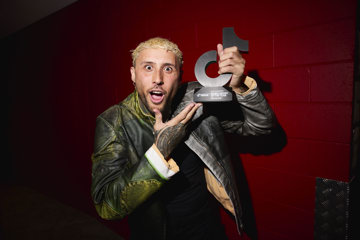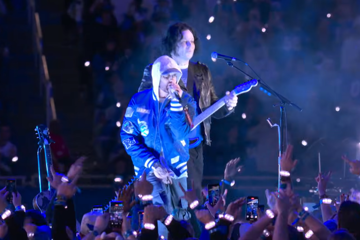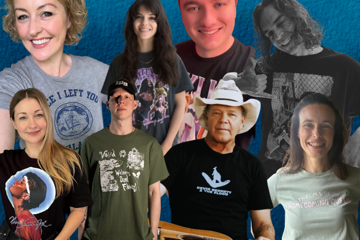Archie Roach Opens Up At BIGSOUND On Using Music To Turn Frustration Into Healing
The musical legend reflected on the role of music not only as entertainment but as a tool for education, empowerment and mobilisation of communities.
The second of BIGSOUND's two keynote panels today, delivered by venerated Indigenous icon Archie Roach with Nancy Bates of the Archie Roach Foundation and moderated by independent freelancer Namila Benson, was an incredibly heartfelt and wide-ranging discussion on the man's incredible journey.
From the Stolen Generations to finding a way to channel his anger and frustrations through music to find a place of peace with himself and others, Roach's observations were spellbinding; capped off with a performance (joined by Bates on acoustic guitar), this session was truly special, and not a person in earshot left unmoved by what they'd heard.
On his musical beginnings
"It wasn't easy, really, the first time, getting up in front if people and singing or, actually, just getting up in front of people on stage, because all eyes are on you," Roach reflected. "It was rather unnerving at first, especially when I sobered up and stopped drinking.
Don't miss a beat with our FREE daily newsletter
"I never have that 'Dutch courage' in my system any more, so I had to get up and present my songs and my music without that ... but the more I did it, the more comfortable I felt."
On the importance of community radio to his career
"Community radio was amazing," he said. "Sometimes I used to get up with my old mate, Gilla Mac [McGuinness] at 3CR in Melbourne. We used to go along there and present songs and talk about them.
"I was working at a place called George Wright Hostel," he explained. "That was a place for homeless men ... some of my old mates I used to drink with, actually.
"One of the Aboriginal presenters there at 3CR asked if I'd come down and sing a few songs, and we got a break," he said. "I'd just written Took The Children Away, and a couple other songs as well. I'd sing these songs around the community ... so they called me up and told me to come down at lunch time and sing a few songs ... so I did that, went down, sang Took The Children Away and another song called Beautiful Child, about deaths in custody ... and that was that, I thought.
"I went back up to work after lunch, up to the hostel, and — I don't know — probably half an hour or maybe 40 minutes went by, and they rung me up and said, 'Archie, Archie, you've gotta come back to the station ... after you sang those songs and told the story about them ... the whole switchboard lit up', everyone wanting to know who this guy was, telling these stories.
"It had a big influence on my music being out there. It was quite strange; I remember, we had a [funeral] cabaret [to raise funds for community funerals] again after that ... it was a big blackout ... a blackfella community event that we used to have, but I remember all these non-Indigenous people, whitefellas, turned up and wanted to come in because they heard I was singing there.
"From then on, I had this strange feeling that things were going to get a little strange for me after there."
On setting up his eponymous foundation
"So many things weren't in place ... they were locking up kids," Roach said. "In Victoria, they can actually incarcerate 10-year-olds. I mean, how mad is that? They can actually incarcerate 10-year-old children. So I thought that was pretty bad. But the system was all around punishment; it had nothing to do with trying to help these young people turn around and change their lives, so there had to be something put in place."
"When you're given something, when people help you in life and give you something, you can't keep it to yourself ... you've got to give it back, and the best way to give it back is just be there, be a signpost for people and point them in the right direction," he mused.
"Music is a way... a lot of these young men and young women need to tell their own story," he said. "Too many other people trying to tell their story for them, and music provides a way for them to not just tell the story but express themselves and just let people know how they're feeling. Some of them don't have a voice, and we've gotta try and provide a place, or put in place strategies through songwriting, through music, through art, to help them find their voice."
Added Bates: "I think it's important to understand that from an Aboriginal worldview, we don't silo things like the arts and life, learning, academia. We are holistic people, so we live in a very connected way to each other and all the forms that life takes."
"When we first started to communicate as people, as we see ourselves now, we communicated in song," she continued. "When we work musically, we're working with something very sacred ... music for us as a people is an absolute, it's part of our essence. Music connects us to our pasts, to our ancestors, to our lore ... when we go in and we connect young people to their music, we are connecting them to their essence as human beings."
Roach again: "The thing is, I understand what a lot of these young people are going through ... I was at a stage, through my drinking and other things that proved detrimental to my life — you come to a stage where you can't look in the mirror any more, at yourself. You come to a point where the self-loathing is so intense … [but] people saw something good in myself that I couldn't see at the time
"You've gotta go back and look at yourself through their eyes. What is it that other people saw in me that I couldn't see in myself?"
On his music taking a turn towards the political
"The songs I used to write, when I started writing songs, were just about falling in love and getting drunk, even though I wasn't drinking any more... but in 1988, I felt an urge to say something," he said of the shift in his creative voice during Australia's 'bicentennial'. "I felt an urge to ... you know; '200 years that Australia's been a country', and I said, 'Nah, nah, this country's timeless'.
"I took exception to the fact that people were celebrating 200 years of being here when we should be celebrating 40,000 years [as it was understood at the time] ... so I started writing songs.
"That was a turning point in my life, to start writing about things that I felt really strongly about and affected me."
"You can be straight out, and I see a lot of young fellas like that today, like A.B. Original; they're pulling no punches and they're strong," he said. "And there's other people who tread a bit softer around it ... the way that I think about things is trying to humanise the whole thing, where it's not 'us and them'; where it's just us. It's us; it's human."
"The fact that we are Aboriginal and Torres Strait Islander people, black people, first people in this country, it's — if you look at it — it's irrelevant," he continued. "I just try to bring people in and embrace them and say, 'This is the Australian experience, this is the Australian story; you either own it or you don't.' You can't just take pieces from history, take all the good parts and say, 'This is us.'"
On why he's still so active as a musician
"I love it," Roach concluded. "I love it.
"I've battled lung cancer; they removed half my left lung. I've got chronic obstructive pulmonary disease ... emphysema. I've got what's known as pulmonary hypertension. But I'm still able to sing, because that's a different dynamic.
"Singing's probably the best thing for me ... And, I don't know what else I'd be doing.
"I live for music, and music lives for me."







